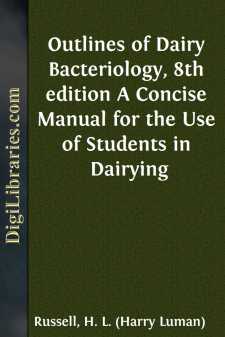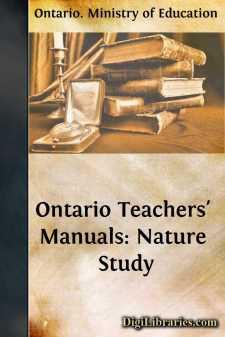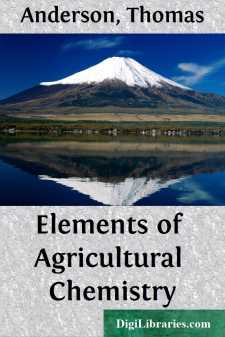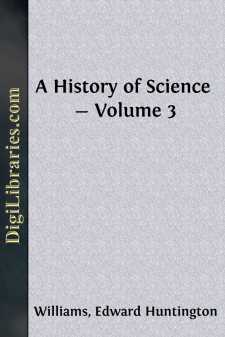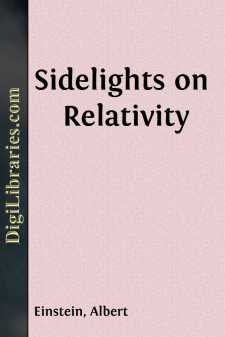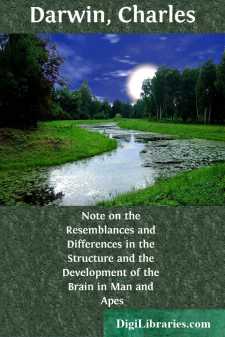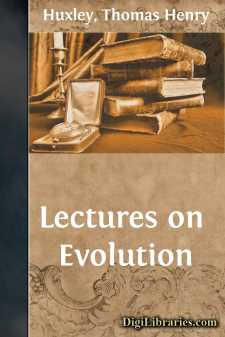Science
- Astronomy 18
- Biology 40
- Chemistry 13
- Electricity 1
- General 38
- History 6
- Light 1
- Paleontology 2
- Philosophy & Social Aspects 1
- Physics 3
- Relativity 2
- Study & Teaching 1
- Waves & Wave Mechanics 1
Science Books
Sort by:
CHAPTER I. STRUCTURE OF THE BACTERIA AND CONDITIONS GOVERNING THEIR DEVELOPMENT AND DISTRIBUTION. Before one can gain any intelligent conception of the manner in which bacteria affect dairying, it is first necessary to know something of the life history of these organisms in general, how they live, move and react toward their environment. Nature of Bacteria. Toadstools, smuts, rusts and mildews are...
more...
by:
Charles Darwin
INTRODUCTION We know from the contents of Charles Darwin’s Note Book of 1837 that he was at that time a convinced Evolutionist. Nor can there be any doubt that, when he started on board the Beagle, such opinions as he had were on the side of immutability. When therefore did the current of his thoughts begin to set in the direction of Evolution? We have first to consider the factors that made for such...
more...
CHAPTER I THE AIMS OF NATURE STUDY Nature Study means primarily the study of natural things and preferably of living things. Like all other subjects, it must justify its position on the school curriculum by proving its power to equip the pupil for the responsibilities of citizenship. That citizen is best prepared for life who lives in most sympathetic and intelligent relation to his environment, and it...
more...
by:
Thomas Anderson
INTRODUCTION. That the phenomena of vegetation are dependent on certain chemical changes occurring in the plant, by which the various elements of its food are elaborated and converted into vegetable matter, was very early recognised by chemists; and long before the correct principles of that science were established, Van Helmont maintained that plants derived their nourishment from water, while Sir...
more...
I. THE SUCCESSORS OF NEWTON IN ASTRONOMYHEVELIUS AND HALLEYSTRANGELY enough, the decade immediately following Newton was one of comparative barrenness in scientific progress, the early years of the eighteenth century not being as productive of great astronomers as the later years of the seventeenth, or, for that matter, as the later years of the eighteenth century itself. Several of the prominent...
more...
THE FORMATIVE PERIOD The best age at which to marry—Incompatibility of temperament—A happy marriage need not be a successful one—The evils of early marriage—The wedding night, its medical aspect—The honeymoon—When marital relations are painful—Times when marital relations should be suspended—The first weeks and months of wifehood—The formative period—A true marriage—A wife's...
more...
by:
Albert Einstein
How does it come about that alongside of the idea of ponderable matter, which is derived by abstraction from everyday life, the physicists set the idea of the existence of another kind of matter, the ether? The explanation is probably to be sought in those phenomena which have given rise to the theory of action at a distance, and in the properties of light which have led to the undulatory theory. Let...
more...
by:
Charles Darwin
The controversy respecting the nature and the extent of the differences in the structure of the brain in man and the apes, which arose some fifteen years ago, has not yet come to an end, though the subject matter of the dispute is, at present, totally different from what it was formerly. It was originally asserted and re-asserted, with singular pertinacity, that the brain of all the apes, even the...
more...
I. THE THREE HYPOTHESES RESPECTING THE HISTORY OF NATURE We live in and form part of a system of things of immense diversity and perplexity, which we call Nature; and it is a matter of the deepest interest to all of us that we should form just conceptions of the constitution of that system and of its past history. With relation to this universe, man is, in extent, little more than a mathematical point;...
more...
WHAT ARE "SPECIES," AND WHAT IS MEANT BY THEIR "ORIGIN" Definition of species—Special creation—The early Transmutationists—Scientific opinion before Darwin—The problem before Darwin—The change of opinion effected by Darwin—The Darwinian theory—Proposed mode of treatment of the subject. The title of Mr. Darwin's great work is—On the Origin of Species by means of...
more...


